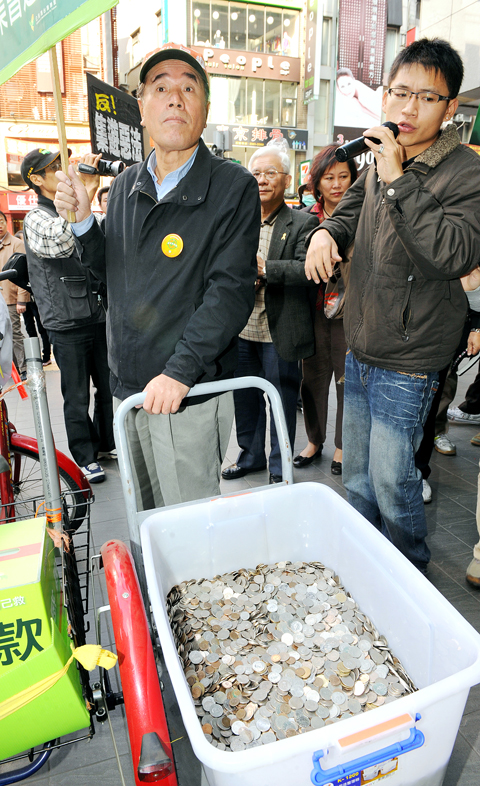Taiwan Referendum Alliance convener Tsay Ting-kuei (蔡丁貴) yesterday criticized the police for fining him for violating the Assembly and Parade Act (集會遊行法) when he walked around outside the Presidential Office with a donation box and some supporters on Wednesday.
Tsay went to Zhongzheng First Precinct police station on Wednesday to pay the fines he had previously received for violating the Act. Tsay had received tickets totaling more than NT$800,000 because he has been conducting a sit-in demonstration against the Assembly and Parade Act outside the Legislative Yuan since October 2008.
Because Tsay found that he did not have enough money to pay the fines, he decided to walk around with a donation box to raise money.

PHOTO: LO PEI-DER, TAIPEI TIMES
Tsay and his supporters were stopped by the police when they approached the side gate of the Presidential Office. They refused to stop and continued to walk around. They received a warning from the police, who said that Tsay and his supporters were in violation of the Assembly and Parade Act and they were asked to “disband.”
“We were only a few people walking on the street trying to raise money, it was neither an assembly nor a parade,” Tsay told the Taipei Times.
“It’s my freedom to wear whatever I want and take whatever I want when I walk on the street — the police have violated my freedom,” he said.
He said while there were other people with him, police officers only surrounded him.
“Is there a law that says that Tsay Ting-kuei cannot walk around the Presidential Office?” he asked. “They could arrest me if I had tried to walk into the Presidential Office, but I was merely walking on the sidewalk outside. The police abused their power.”
Taiwan Association for Human Rights secretary-general Tsai Chi-hsun (蔡季勳) agreed with Tsay.
Tsai said what had happened to Tsay showed that the Assembly and Parade Act is ridiculous and unnecessary.
“What Tsay Ting-kuei did would not be considered a violation of the Assembly and Parade Act if he did it elsewhere. What he did was declared illegal because the Presidential Office is a ‘sensitive’ place,” Tsai said. “This shows that the Act gives police too much power to decide what constitutes a violation of the law.”
On the other hand, police said the way officers acted was legal and justified.
“[Tsay and his supporters] walked in group — though there was quite a distance between them — and they held placards with slogans. Of course it was a demonstration,” said Yang Chih-chieh (楊志傑), the commander at the scene on Wednesday. “We may allow them to walk around elsewhere, but the area surrounding the Presidential Office is a restricted zone, so we had to stop them.”
Zhongzheng First Police Precinct Chief Inspector Jason Yu (于增祥) said he understood why many people do not like the Assembly and Parade Act.
“Whether it’s a good law or a bad law, as long as it’s still there we have to enforce it,” he said.

Weather conditions across Taiwan are expected to remain stable today, but cloudy to rainy skies are expected from tomorrow onward due to increasing moisture in the atmosphere, according to the Central Weather Administration (CWA). Daytime highs today are expected to hit 25-27°C in western Taiwan and 22-24°C in the eastern counties of Yilan, Hualien, and Taitung, data on the CWA website indicated. After sunset, temperatures could drop to 16-17°C in most parts of Taiwan. For tomorrow, precipitation is likely in northern Taiwan as a cloud system moves in from China. Daytime temperatures are expected to hover around 25°C, the CWA said. Starting Monday, areas

A Taiwanese software developer has created a generative artificial intelligence (AI) model to help people use AI without exposing sensitive data, project head Huang Chung-hsiao (黃崇校) said yesterday. Huang, a 55-year-old coder leading a US-based team, said that concerns over data privacy and security in popular generative AIs such as ChatGPT and DeepSeek motivated him to develop a personal AI assistant named “Mei.” One of the biggest security flaws with cloud-based algorithms is that users are required to hand over personal information to access the service, giving developers the opportunity to mine user data, he said. For this reason, many government agencies and

The National Fire Agency on Thursday said a series of drills simulating a magnitude 8.5 earthquake would be held in September to enhance the government’s emergency response capabilities. Since earthquakes cannot be predicted, only by continuously promoting disaster prevention measures could Taiwan enhance its resilience to earthquakes, agency Director-General Hsiao Huan-chang (蕭煥章) said in a news release. The exercises would be held to mark annual National Disaster Prevention Day on Sept. 21, the aim of which is to test Taiwan’s preparedness and improve its earthquake resilience in case of a major temblor, Hsiao said. As part of those drills, an earthquake alert would

STRICTER ENFORCEMENT: Taipei authorities warned against drunk cycling after a sharp rise in riding under the influence, urging greater public awareness of its illegality Taipei authorities have issued a public warning urging people not to ride bicycles after consuming alcohol, following a sharp rise in riding under the influence (DUI) cases involving bicycles. Five hundred and seven people were charged with DUI last year while riding YouBikes, personal bicycles, or other self-propelled two-wheelers — a fourfold increase from the previous year, data released by the Taipei Police Department’s Traffic Division showed. Of these, 33 cases were considered severe enough to be prosecuted under “offenses against public safety,” the data showed. Under the Road Traffic Management and Penalty Act (道路交通管理處罰條例), bicycles — including YouBikes and other